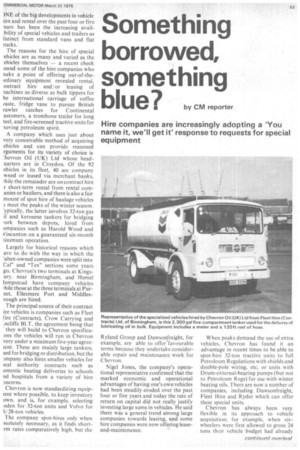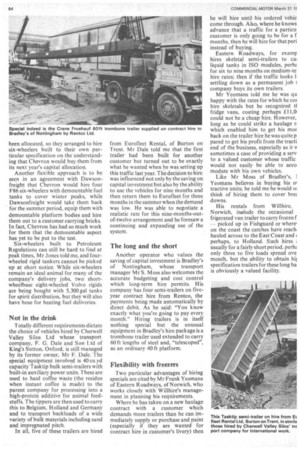Something borrowed, something blue?
Page 65

Page 66

If you've noticed an error in this article please click here to report it so we can fix it.
by CM reporter
Hire companies are increasingly adopting a 'You name it, we'll get it' response to requests for special equipment
)NE of the big developments in vehicle tire and rental over the past four or five 'ears has been the increasing avail.bility of special vehicles and trailers as listinct from standard vans and flat rucks.
The reasons for the hire of special 'elides are as many and varied as the ehicles themselves — a recent check ound some of the hire companies who nake a point of offering out-of-theirdinary equipment revealed rental, ontract hire and/or leasing of aachines as diverse as bulk tippers for he international carriage of coffee taste, fridge vans to pursue British rawler catches for Continental ustomers, a trombone trailer for long tee!, and fire-screened tractive units for loving petroleum spirit.
A company which uses just about very conceivable method of acquiring ehicles and can provide reasoned rguments for its variety of choice is :hevron Oil (UK) Ltd whose headuarters are in Croydon. Of the 92 ehicles in its fleet, 40 are company wned or leased via merchant banks, thile the remainder are on contract hire r short-term rental from rental cornanies or hauliers, and there is also a fair mount of spot hire of haulage vehicles ) meet the peaks of the winter season. 'ypically, the latter involves 32-ton gas il and kerosene tankers for bridging 7ork between depots, hired from ompanies such as Harold Wood and Vincanton on a guaranteed six-month iinimum operation.
Largely for historical reasons which ave to do with the way in which the 'altex-owned companies were split into Cal" and "Tex" sections some years go, Chevron's two terminals at Kingsury, near Birmingham, and Hemel lempstead have company vehicles thile those at the three terminals at Pureet, Ellesmere Port and Middlesrough are hired.
The principal source of their contract ire vehicles is companies such as Fleet lire (Contracts), Crow Carrying and ,ncliffe BILT, the agreement being that
they will build to Chevron specifica ons the vehicles will run in Chevron very under a minimum five-year agreelent. These are mainly large tankers, sed for bridging or distribution, but the ampany also hires smaller vehicles for wal authority contracts such as omestic heating deliveries to schools nd hospitals from a variety of hire )ncerns.
Chevron is now standardizing equiplent where possible, to keep inventory own, and is, for example, selecting oden for 32-ton units and Volvo for 5/28-ton vehicles.
The company spot-hires only when molutely necessary, as it finds shortrm rates comparatively high, hut the
Ryland Group and Dawsonfreight, for example, are able to offer-favourable terms because they undertake considerable repair and maintenance work for Chevron.
Nigel Jones, the company's operational representative confirmed that the marked economic and operational advantages of having one's own vehicles had been steadily eroded over the past four or five years and today the rate of return on capital did not really justify investing large sums in vehicles. He said there was a general trend among large companies towards leasing, and some hire companies were now offering leaseand-maintenance. When peaks demand the use of extra vehicles. Chevron has found it an advantage in recent times to be able to spot-hire 32-ton tractive Units to full Petroleum Regulations with shields and double-pole wiring. etc, or units with Drum-external-bearing pumps (but not to Petroleum Regs) for use with winter heating oils. There are now a number of companies, including Dawsonfreight, Fleet Hire and Ryder which can offer these special units.
Chevron has always been very flexible in its approach to vehicle acquisition: for example, when sixwheelers were first allowed to gross 24 tons their vehicle budget had already been allocated, so they arranged to hire six-wheelers built to their own particular specification on the understanding that Chevron would buy them from its next year's capital allocation.
Another flexible approach is to be seen in an agreement with Dawsonfreight that Chevron would hire four F86 six-wheelers with demountable fuel tanks to cover winter peaks, while Dawsonfreight would take them back for the summer period, equip them with demountable platform bodies and hire them out to a customer carrying bricks. In fact, Chevron has had so much work for them that the demountable aspect has yet to be put to the test.
Six-wheelers built to Petroleum Regulations can still be hard to find at peak times, Mr Jones told me, and fourwheeled rigid tankers cannot be picked up at short notice. While six-wheelers remain an ideal animal for many of the company's delivery jobs, two shortwheelbase eight-wheeled Volvo rigids are being bought with 5,300 gal tanks for spirit distribution, but they will also have hose for heating fuel deliveries.
Not in the drink
Totally different requirements dictate the choice of vehicles hired by Cherwell Valley Silos Ltd whose transport company, F. G. Dale and Son Ltd of King's Sutton, Oxford, is still managed by its former owner, Mr F. Dale. The special equipment involved is 40 cu yd capacity Task tip bulk semi-trailers with built-in auxiliary power units. These are used to haul coffee waste (the residue when instant coffee is made) to the parent company for processing into a high-protein additive for animal feedstuffs. The tippers are then used to carry this to Belgium, Holland and Germany and to transport bacicloads of a wide variety of bulk materials including sand and impregnated pitch.
In all, five of these trailers are hired from Eurofleet Rental, of Burton on Trent. Mr Dale told me that the first trailer had been built for another customer but turned out to be exactly what he wanted when he was setting up this traffic last year. The decision to hire was influenced not only by the saving on capital investment but also by the ability to use the vehicles for nine months and then return them to Eurofleet for three months in the summer when the demand was low. He was able to negotiate a realistic rate for this nine-months-outof-twelve arrangement and he foresaw a continuing and expanding use of the system.
The long and the short
Another operator who values the saving of capital investment is Bradley's of Nottingham, whose transport manager Mr S. Moss also welcomes the accurate budgeting and cost control which long-term hire permits. His company has four semi-trailers on fiveyear contract hire from Renter), the payments being made automatically by direct debit. As he said: "You know exactly what you're going to pay every month." Hiring trailers is in itself nothing special but the unusual equipment in Bradley's hire package is a trombone trailer used extended to carry 60 ft lengths of steel and, "telescoped", as an ordinary 40 ft platform.
Flexibility with freezers
Two particular advantages of hiring specials are cited by Mr Frank Yeomans of Eastern Roadways, of Norwich, who works closely with Willhire's management in planning his requirements.
Where he has taken on a new haulage contract with a customer which demands more trailers than he can immediately supply or purchase and paint (especially if they are wanted for contract hire in customer's livery) then he will hire until his ordered vehic come through. Also, where he knows advance that a traffic for a particu customer is only going to be for a f months, then he will hire for that peni instead of buying.
Eastern Roadways, for examp hires skeletal semi-trailers to ca.] liquid tanks in ISO modules, perk for six to nine months on medium-te hire rates; then if the traffic looks I settling down as a permanent job 1 company buys its own trailers.
Mr Yeomans told me he was qu happy with the rates for which he coi hire skeletals but he recognized ti fridge vans, costing perhaps £11,01 could not be a cheap hire. However, long as he could strike a haulage r which enabled him to get his MOT back on the trailer hire he was quite p pared to get his profit from the tracti end of the business, especially as it v sometimes a case of providing a serv to a valued customer whose traffic would not easily be able to acco modate with his own vehicles.
Like Mr Moss of Bradley's, 1 Yeomans believes in buying his cy tractive units; he told me he would oi think of hiring them to cover bre; downs.
His rentals frorn Willhire, Norwich, inulude the occasional frigerated van trailer to carry frozen f — picked up in Fishguard or where' on the coast the catches have reach' hauled across to the East Coast and perhaps, to Holland. Such hires usually for a fairly short period, perh; only three to five loads spread ove month, but the ability to obtain hi specification trailers for these long ha is obviously a valued facility.








































































































































